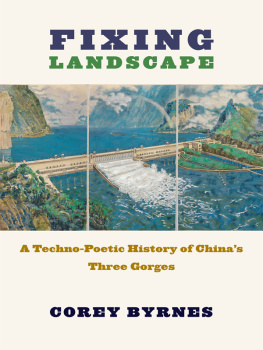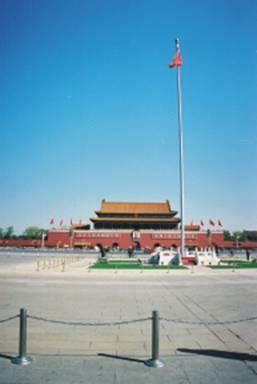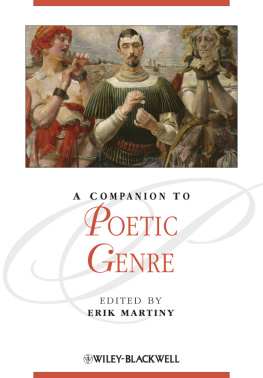Table of Contents
FIXING
LANDSCAPE
Studies of the Weatherhead East Asian Institute, Columbia University
Studies of the Weatherhead East Asian Institute, Columbia University
The Studies of the Weatherhead East Asian Institute of Columbia University were inaugurated in 1962 to bring to a wider public the results of significant new research on modern and contemporary East Asia.
FIXING
LANDSCAPE
A Techno-Poetic History of Chinas Three Gorges
COREY BYRNES
COLUMBIA UNIVERSITY PRESS New York
COLUMBIA UNIVERSITY PRESS
PUBLISHERS SINCE 1893
NEW YORK CHICHESTER, WEST SUSSEX
cup.columbia.edu
Columbia University Press wishes to express its appreciation for assistance given by the Wm. Theodore de Bary Fund in the publication of this book.
Copyright 2018 Columbia University Press
All rights reserved
E-ISBN 978-0-231-54712-3
Library of Congress Cataloging-in-Publication Data
Names: Byrnes, Corey J., 1980 author.
Title: Fixing landscape: a techno-poetic history of Chinas Three Gorges / Corey Byrnes.
Description: New York: Columbia University Press, [2018] | Series: Studies of the Weatherhead East Asian Institute, Columbia University | Includes bibliographical references and index.
Identifiers: LCCN 2018017833| ISBN 9780231188067 (cloth: alk. paper) | ISBN 9780231547123 (e-book)
Subjects: LCSH: Yangtze River Gorges (China)History.
Classification: LCC DS793.Y3 B96 2018 | DDC 951.2dc23
LC record available at https://lccn.loc.gov/2018017833
A Columbia University Press E-book.
CUP would be pleased to hear about your reading experience with this e-book at .
Cover image:
Yang Jiechang, Crying Landscape (Yangzi River Dam), 2003.
Image courtesy of the artist
CONTENTS
I STILL REMEMBER THE FIRST TIME I TRIED TO ARTICULATE THE half-formed ideas that inspired this project. At the end of my PhD qualifying exams, I explained to my committeeAndrew Jones, Paula Varsano, Pat Berger, and Robert Ashmorethat I wanted to write a dissertation that spanned two millennia, in which I could think comparatively about Tang poetry and contemporary film. It would have been easy for them to dismiss this plan as ill conceived. Instead, they listened carefully, took my ideas seriously, and encouraged me to pursue them. What I did not realize then was that they were also signing on without hesitation to the mammoth task of guiding me through this project. As my co-advisers, Paula Varsano and Andrew Jones have given me more of their precious time and energy than I am comfortable admitting. They remain my models for what it means to be a good colleague, an exemplary scholar, and a kind human being under even the most trying of circumstances. I am lucky that they remain my mentors, but far luckier that I can call them my friends. I have Dore Levy to thank for encouraging me to apply to Berkeley, but also for introducing me to the wonders of Chinese poetry and feeding me so many delicious meals. Fixing Landscape would not exist without her.
Many of the ideas that found their way into this book were developed in exchanges at Berkeley and beyond. Katrina Dodson, Emily Drumsta, Toby Warner, and Tristram Wolff joined me in my first (and only) dissertation-writing group. In reading the earliest version of the final chapter, Alan Tansman made a number of transformative interventions. I am indebted to Jason McGrath, whose very careful (and generous) reading of an early version of helped advance the dissertation at a key stage in its development. Thanks also to Michael Cherney and Yun-fei Jitheir art has sustained me through the long process of finishing this project.
In one of the first (and hardest) seminars I took at Berkeley, Robert Ashmore gave me a sense of what it really means to read Du Fu. I am still in awe and still trying my best. In that seminar and others, I was privileged to learn from my fellow studentsRoy Chan, Laurence Coddere, Menghsin Horng, Liu Xiao, Patrick Luhan, Lawrence Yang, Yueni Zhong, and many others. The winter after my exams, I was lucky to find a temporary home of unusual warmth with friends and family in BerlinLydia Brotherton, Marion Detjen and family, Gunnar Klack, Robyn Schulkowsky, and Eike Wittrock.
Fixing Landscape really began to take shape during my time in the Department of East Asian Languages and Cultural Studies at the University of California, Santa Barbara. I am eternally grateful to my colleague Michael Berry for his unstinting support through tough times. He is a great scholar and a remarkably kind man. Thanks also to Gillian Osborne, Brian Petit, and everyone else who helped make the Central Coast feel like home, if only for a short time.
Northwestern Universitys generous institutional support and unfailingly collegial intellectual community made finishing this book not only possible but also pleasurable. I am especially lucky to have had the mentorship of Laura Brueck as well as the support and guidance of Peter Fenves, Susannah Gottlieb, Laura Hein, Rajiv Kinra, Jules Law, Amy Stanley, and Paola Zamperini. Special thanks to all my colleagues in the Department of Asian Languages and Cultures and to Jean Deven for performing superhuman feats on an almost daily basis. To Patrick Noonan, my Berkeley friend and Northwestern colleague, I am lucky to share an office wall with you. In co-organizing a workshop on the Environmental Humanities through the Alice Kaplan Institute for the Humanities, I have had the pleasure of working with Tom Burke, Jill Mannor, and Wendy Wall, who have created an intellectual world of rare warmth and rigor in Kresge Hall. To my workshop co-organizer Keith Woodhouse and to all the workshop stalwarts, you have done a great deal to make this a better book. Thanks also to Mario Aranda, Nadim Audi, Lydia Barnett, Csar Braga-Pinto, Sarah Dimick, Paul Fagan, Jun Hu, Michelle Huang, Rebecca Johnson, Andrew Leong, Nick Valvo, and many other friends and colleagues for making Chicago winters more than just bearable. A special thanks to Harris Feinsod, Emily Licht, and David Simon, old friends who went above and beyond to make a new city feel like home.
A well-timed year at Harvard Universitys Mahindra Humanities Center under the inimitable leadership of Homi K. Bhabha made the completion of this book possible. My sincere thanks to him for his radical hospitality and to the Andrew W. Mellon Foundation for funding my fellowship. To my fellows in the Slow Violence seminarAnna Abramson, Betsy Beasley, Mark Geraghty, Callie Maidhof, Isaiah Lorado Wilneryour exceptional work is an inspiration. To the staff of the Mahindra Humanities CenterSteve Biel, Mary Halpenny-Killip, and Sarah RazorI could not have asked for a kinder, more welcoming group of colleagues. A special thank-you to Andrea Volpe, the Mellon Seminar coordinator at the Center, for listening, understanding, and knowing when it was time for a drink. This project also benefited from the generous support of numerous other people at Harvard, especially Karen Thornber, who not only invited me to join important conversations about the Environmental Humanities, but also took the time to read my work with care; Eugene Wang, whose feedback on the final chapter helped me suss out the hidden ecology of my book; and David Der-wei Wang, who is as gracious as he is brilliant.
During my time in Cambridge, I had the privilege of discussing my work with many exceptional scholars, including Arunabh Ghosh, Brian Lander, Stephanie LeMenager, Elizabeth Lord, Covell Meyskens, Anne Reinhardt, Shu-mei Shih, Amy Zhang, and Ling Zhang, all of whom pushed me to strengthen the interdisciplinary bones of my project, none more convincingly than Ling, an old friend from the other Cambridge and a true ally. Special thanks to my lunch partner Gillian Osborne, who kept me company in the attic of Warren House, and to Brian and Quinn for bringing much needed domestic joy into my life; to Kim Icreverzi, who read (and reread) at a crucial moment; to Daniel Callahan, for introducing me to Provincetown; to Jacob Moses, for taking me to swim in Walden Pond; and to David Francis, Joseph Lee, and Kris Trujillo for their excellent company.






